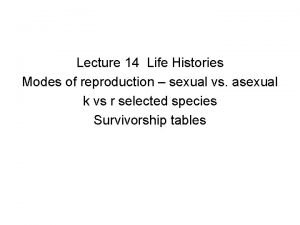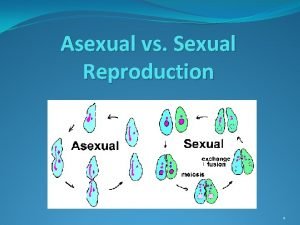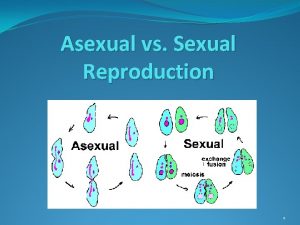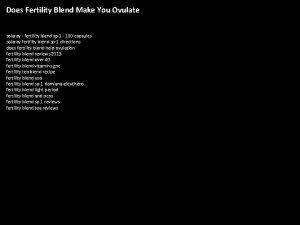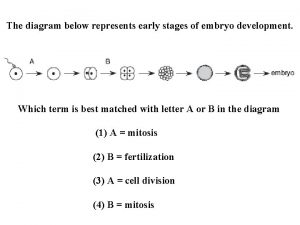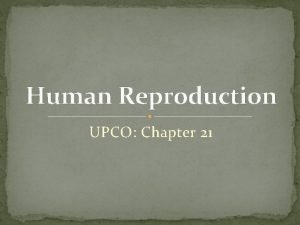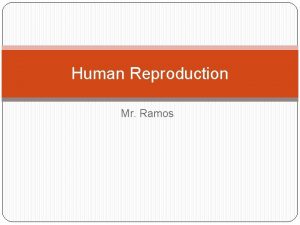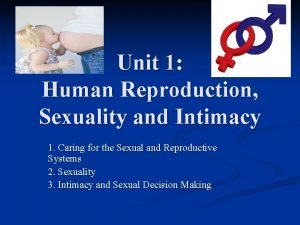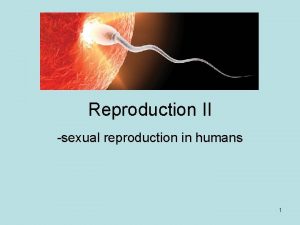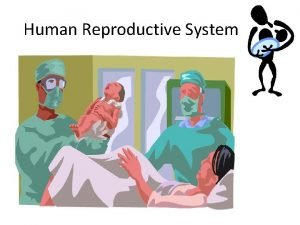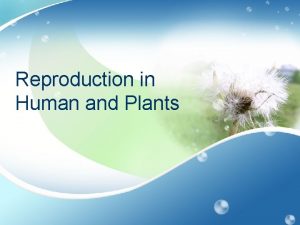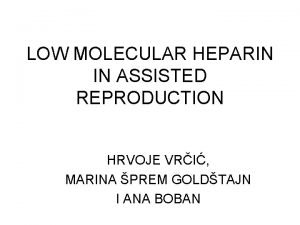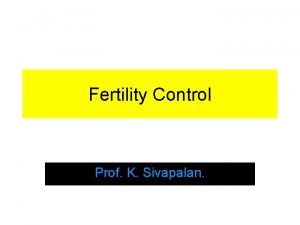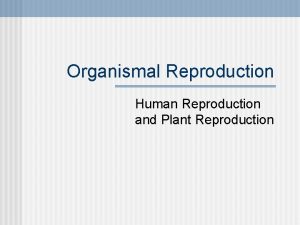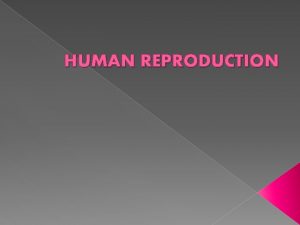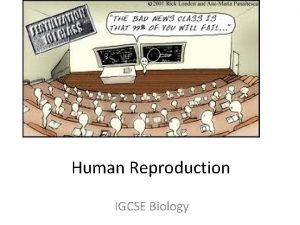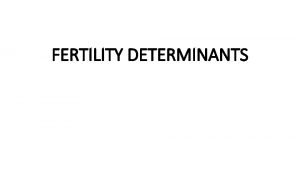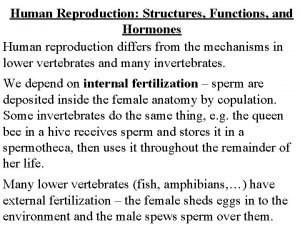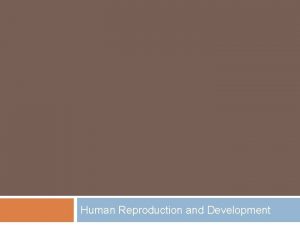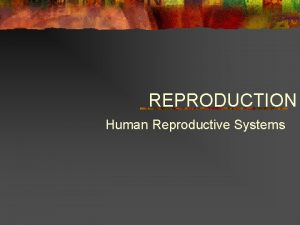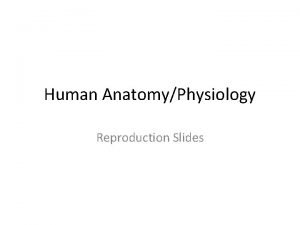Human Fertility and Reproduction I can reflect on












- Slides: 12

Human Fertility and Reproduction I can reflect on the connection between good general health and aspects of human fertility and reproduction. I understand the common causes of infertility. I understand that miscarriage affects many families. I understand that the menopause is the natural time in a woman’s life where she can no longer become pregnant.

Human fertility and reproduction Fertility is the natural capability to produce offspring. Reproduction (or procreation or breeding) is the biological process by which new individual organisms – "offspring" – are produced from their "parents". In this activity we talk and learn about: • Pregnancy • Miscarriage • Fertility • Infertility • Menopause

Let’s remember what we learned a long time ago…. A woman’s eggs are kept inside her body, in her ovaries. Every month (her hormonal cycle) a woman releases an egg. A man’s sperm is made in his testicles which are inside the bag of skin (scrotum) that hangs behind his penis. Fertilisation can happen when the egg and the sperm meet, this can happen in different ways. rshp. scot

During sex, the man’s penis can go inside the woman’s vagina. When the man ejaculates, the sperm comes out and goes to meet the egg inside the woman’s body. Some parents need help to start the pregnancy. Some babies start when the egg and sperm come together in a laboratory. The doctor then puts the fertilised egg back into the woman’s womb. This is called IVF (In vitro fertilisation). Other babies are created when a man gives his sperm to the woman, this is called being a donor. She puts the sperm inside her vagina. If the sperm swim to meet her egg, she can become pregnant. rshp. scot

Human reproduction https: //www. bbc. com/bitesize/clips/z pmqxnb (Duration 1 minute 3 seconds) How a baby develops during pregnancy (duration 4 minutes 17) https: //youtu. be/h 82 ltr 84_Yg rshp. scot

Miscarriage: A miscarriage is the loss of a baby before 24 weeks. Early miscarriages happen in the first 12 weeks of pregnancy. A woman may have a miscarriage before they even know they are pregnant. If this happens it can feel like a late period with heavy bleeding. In women of 20, around 15% pregnancies will end in miscarriage In women of 30, around 18% pregnancies will end in miscarriage In women of 40, around 38% pregnancies will end in miscarriage In women of 45, around 70% pregnancies will end in miscarriage.

Miscarriage • Most of the time there is no clear reason why it happens, but it is very unlikely to be caused by anything a woman did or didn’t do. • Doctors think most miscarriages are caused when the building blocks controlling the development of a baby (the chromosomes) aren’t right. Babies with too many or not enough chromosomes won't develop properly. This can lead to a miscarriage. • The experience of miscarriage is unique to each person and for some it may be a time of sadness and feelings of loss and grief. Film: Finding out why miscarriage happens (2 minutes 56) https: //youtu. be/4 JPDNZ 0 j. Vpk

Fertility is the natural capability to produce offspring. Have you ever thought about your fertility? Women have a hormonal cycle which determines when they can get pregnant. The cycle is approximately twenty-eight days long, with a fertile period of five days per cycle, but this does vary between women. Men are fertile continuously, and their sperm quality is affected by their health, frequency of ejaculation, and environmental factors. Everybody has a different level of fertility. Sometimes it isn’t possible to find out why a person is infertile. Film: Your Fertility Matters (3 minutes 51 secs): https: //youtu. be/ETw. DCKBa. Yd 4

What is infertility? Some women get pregnant quickly, but for others it can take longer. If a woman cannot get pregnant this may be because she or a male partner may be infertile. There a number of things can cause infertility, many can be treated successfully. Film: Common causes of female infertility (3 minutes 32) https: //youtu. be/DMNFSkh. BECs Film: Common causes of male infertility (stop at 2 minutes 39) https: //youtu. be/trc. PT_Gw 2 o 8

Infertility • Infertility affects one in seven couples • Age and lifestyle factors affect both male and female fertility • STIs are one of the biggest preventable causes of infertility in teens – always use condoms • 20% of women in the UK do not have a child: this includes women who wanted to but couldn’t • Fertility treatment can’t help everyone. • Your fertility matters so take care of it.

Are you thinking about your fertility in any new ways now?

What is the menopause? • The menopause is when periods stop naturally. This usually happens around the age of 47 to 52, although this varies for every individual. • As menopause approaches, a woman's periods first become further apart, then the odd period is missed, then they stop. • Most of the physical effects associated with the menopause are due to oestrogen deficiency. The psychological effects of the menopause can also vary. Some women feel they have come to the end of reproductive life, viewing the menopause as a significant stage in ageing. Others feel free from the worry of pregnancy, monthly periods, and perhaps the continuous use of contraception.
 Asexualk
Asexualk Sexual and asexual reproduction venn diagram
Sexual and asexual reproduction venn diagram Venn diagram of asexual and sexual
Venn diagram of asexual and sexual Fertility blend hombre
Fertility blend hombre The diagram below represents chromosomes in a zygote
The diagram below represents chromosomes in a zygote Human reproduction webquest
Human reproduction webquest Reproduction human
Reproduction human Introduction of human reproduction
Introduction of human reproduction Reproduction in humans
Reproduction in humans Sexual reproduction in humans
Sexual reproduction in humans Note on hypothalamus
Note on hypothalamus Male reproductive system in plant
Male reproductive system in plant Reproduction in human
Reproduction in human
